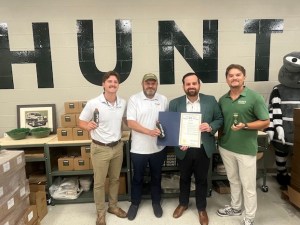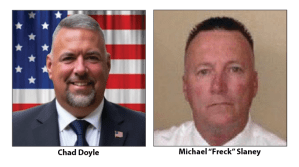Stine pushes storm victims’ insurance reform package
Published 5:30 pm Sunday, July 3, 2022

- State Sen. Jeremy Stine at the state Capitol in Baton Rouge. (Special to the American Press)
State Sen. Jeremy Stine, R-Lake Charles, District 27, promised to give storm victims a voice in Baton Rouge if he were elected in 2021. He went into the legislative session with the intention of creating real reform, shedding light on the industry and protecting consumers, he said, particularly the customer experience of filing a claim and getting paid what they’re owed.
“You know about all the delay tactics and adjustor swapping that went on after the hurricanes,” Stine said. “My goal was to deter the bad actors.”
Senate Bill 208, which would increase bad-faith penalties paid by insurance companies from 50 percent to 100 percent, was particularly controversial.
Trending
In Louisiana, in addition to the loss of the value of the claim, the insurer may also be subject to a penalty of up to 50 percent of the amount owed to the insured. Increasing the bad-faith penalty could, perhaps, deter the bad actors. It also had the potential to cause insurers to leave the state,w limiting competition between providers and reducing options for consumers.
“There is a real concern of too many insurers pulling out of the state,” Stine said. “It’s happening now in Florida. We needed to get their attention. They can no longer deny or delay paying these claims they are contractually obligated to pay. But we had to strike a balance.”
Listening to all sides of the debate was important and eye opening.
“A lot of times the homeowner’s perspective got lost in this conversation,” Stine said. “That was frustrating. It was important to me that it be kept at the forefront.”
The balance struck was suspending the proposed increase in penalties until more data could be collected. The Senate Resolution 140 urges the Commissioner of Insurance to study the issue of insurers failing to timely pay property damage claims after a presidential or gubernatorial declared disaster or emergency and report his findings and recommendations to the Senate and House Committees on insurance in February 2023.
“We hope to have better data that this is the right path forward,” Stine said.
Trending
While Stine says he’s pleased overall at the outcome of the storm victims’ insurance reform package — 11 instruments authored, co-authored or sponsored — he says he sees the Hurricane Mediation Program and the statewide claims adjuster database as clear consumer wins. Stine said the statewide claims adjuster database will be an easy-to-use, more modernized database that allows the consumer to more easily search for information including any administrative action taken against the claims adjuster.
“Previously this option was available but tough to use, hard to find and confusing to some consumers,” Stine said.
With this information, consumers can request a new adjuster if any issues or concerns arise.
The Louisiana Department of Insurance established the Hurricane Ida Mediation Program as an option for the commissioner to use at his discretion. However, to be activated, it required the commissioner’s approval and limited the program region by region and maximum claim amounts.
“It was great to see how this program succeeded after Hurricane Ida,” Stine said. “We codified the program into law and updated it to include claims up to $150,000 and to go into effect statewide and automatically after the governor declares an emergency declaration for a named storm event. It’s voluntary for plaintiffs and defendants and could lead to speedier, non-adversarial solutions. The goal is to quickly settle more claims amicably, prevent long, burdensome litigation and spread awareness for non-adversarial solutions.”
Other Storm Victims’ Insurance Reform that became law or resolutions includes financial incentives to attract insurance companies to Louisiana for parishes below Interstate 10, cracking down on misleading advertising from the insurance industry, communicating policy holders rights when a claim is filed after a declared disaster, preventing contractors from interpreting an insurance policy or adjusting a property insurance claim on behalf of the insured, fines in lieu of suspension or revocation of certificate of authority for out-of-state insurers, minimum capital and surplus requirements for certain domestic insurers and requirements that every insurer and every health maintenance organization have a catastrophe response plan.






